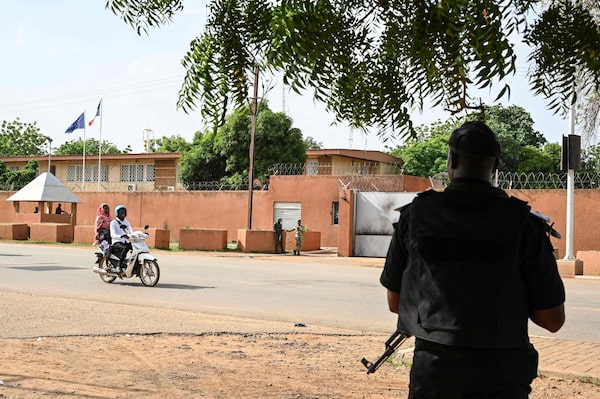
A moto-taxi carries a passenger past the French Embassy in Niamey on Aug. 28. Thousands of people demonstrated on Aug. 27 in Niger in support of last month's coup, a few hours before the deadline given to France's ambassador in an ultimatum to leave the country.-/AFP/Getty Images
A month after Niger’s military coup, the country is facing a rapidly deteriorating humanitarian crisis, with its people suffering from increasing violence and a sharp rise in food prices, the United Nations refugee agency said in a report Tuesday.
Attacks by insurgent groups have forced more than 20,000 people to flee their homes since the coup, and soaring prices for many commodities have worsened the already dire situation in the West African country, the report says.
A group of military officers seized power in Niger and placed its President, Mohamed Bazoum, under house arrest on July 26. The Economic Community of West African States, a bloc made up of 15 countries in the region, soon imposed sanctions on Niger and closed its borders with the country. The bloc has repeatedly threatened to launch a military intervention to restore Mr. Bazoum to power, but the junta has entrenched its rule since then.
Thousands of trucks, including many with humanitarian aid, have been stranded at Niger’s closed borders, and UN aid flights have been grounded because of a lack of jet fuel. The UN is seeking an exemption from the ECOWAS sanctions to allow food and medicine into the country, one of the poorest in the world.
“Food and commodity prices, already climbing before this crisis, jumped after sanctions were introduced and appear set to continue rising as the closure of borders with ECOWAS countries will make food and other commodities scarcer,” the UN refugee agency’s Niger representative, Emmanuel Gignac, said at a briefing in Geneva.
Mr. Gignac, a Canadian, said the refugee agency’s staff have witnessed a sharp increase in kidnapping, sexual violence, human trafficking and other dangers since the military takeover.
Radical Islamist militias have escalated their attacks on government forces since the coup, exploiting the political instability and the junta’s diversion of troops to defend itself. More than 100 people have been killed in Niger, including about 30 soldiers, in reported jihadist attacks this month. In one attack on Aug. 15, 17 soldiers were killed in an ambush on a military convoy.
Robert Rotberg: The coup in Niger is a boon for Africa’s jihadist militias
Analysts say the violence is worrisome because such attacks had been in decline before the coup. Last year, and in the first half of this year, the number of deaths caused by jihadist activity had declined.
Despite the threats from ECOWAS to send troops into Niger if the junta refuses to step down, the coup leaders have shown no sign of relenting. The military regimes of neighbouring Mali and Burkina Faso have vowed to defend the Niger junta if ECOWAS attempts any military intervention.
On the weekend, the junta ordered Niger’s armed forces to go on maximum alert because of the “threats of aggression.” It also ordered France’s ambassador to leave the country by Monday, but France refused to withdraw its envoy. France and the United States have about 2,500 troops in Niger. Canada has a small number of military trainers in the country.
Even before the coup, Niger was suffering a food-security crisis. About 3.3 million people there (13 per cent of the country’s population) were already considered “severely food insecure” this year, and a further 7.3 million people were at risk of falling into this category, according to a report this month from the UN’s food agency, the World Food Programme. The report cited heavy pressures on Niger’s food markets, partly because of Russia’s suspension of an agreement that had allowed Ukrainian grain exports.
Niger’s political crisis and the ECOWAS sanctions are worsening the food situation in several ways, according to the food agency. The border closings and trade suspension will reduce the supply of imported food, which in turn will lead to price increases for locally produced food, it said.
In one example of this pressure, the food agency noted, the average price of rice jumped by 17 per cent in the first week after the sanctions were announced.
In addition, it said, financial sanctions will reduce the flow of remittances from outside the country, which are crucial for many poor families. Truck drivers, traders and farmers who export their produce and livestock to Nigeria will be hurt by the closed borders. Civil servants will be hit by a reduction in the government budget. And, according to the food agency, there will be “significant job losses” in other sectors as foreign companies and embassies cut back their operations.
 Geoffrey York
Geoffrey York